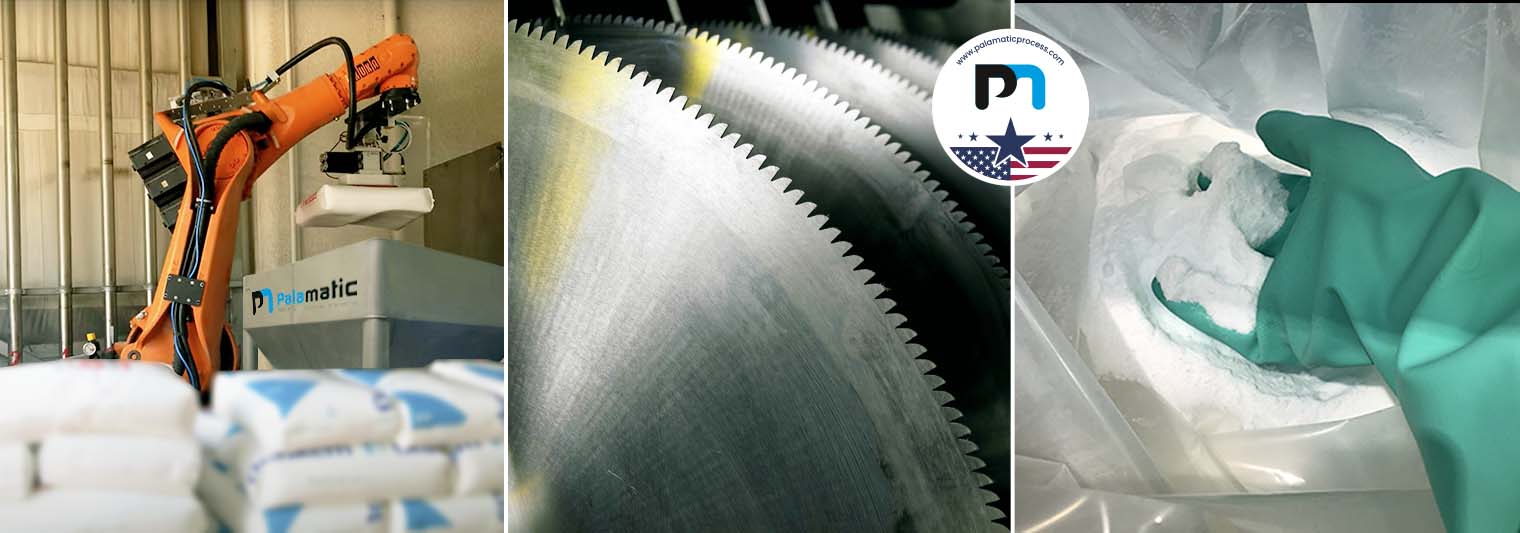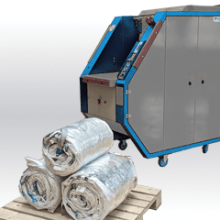Description
The SackBot 130 for sack emptying: precision, cleanliness, and safety to enhance your productivity.
The SackBot 130 for sack emptying delivers precision, cleanliness, and safety to enhance your productivity.
The SackBot range, including models 110, 120, and 130, has been designed to address the modern challenges of sack handling and emptying in the most demanding industrial environments.
Whether managing fine powders, granular products, or complex materials, SackBot robots stand out for their precision, efficiency, and ability to integrate seamlessly into a variety of production lines.
From processing plastic granules to handling fine and challenging powders, each model provides a tailored solution to meet specific industrial needs. This improves productivity, reduces risks for operators, and ensures optimal continuity of production flows.
-
Automation5
-
Hygiene5
-
Rate4
SackBot 130: A Robotic Solution to Enhance Your Industrial Performance

A Comprehensive Range of Robots for Diverse Needs
The SackBot 130 is the most advanced model in the range.
Designed to handle the most complex powders and a variety of sack types (except woven sacks), this robot integrates cutting-edge cutting and emptying technology, ensuring consistent and flawless results.
Thanks to its cross-positioned mobile blades and precise gripping system, this robot can handle a wide variety of powders, even those with hygroscopic or compact properties.
Advantages of Robots That Transform Your Industrial Processes
- Enhanced Operational Efficiency: With an adapted speed (1 to 2 sacks per minute) and residue-free cutting, the SackBot 130 optimizes your raw material flow, enabling uninterrupted and seamless production.
- Impeccable Hygiene: Its stainless steel design ensures full compliance with food and pharmaceutical standards, reducing the risk of contamination.
- Risk Reduction: By minimizing manual handling, SackBot robots reduce hazards for operators while increasing productivity.
Variants of Gripping Systems
| Variant | Pallet Detection Method | Robot Translation Possible | Ideal Applications |
|---|---|---|---|
| A | Palletization plan | No | Stable configurations |
| B | Camera | No | Precise repositioning |
| C | Palletization plan | Yes | Expanded fixed zones |
| D | Camera | Yes | Complex environments |
Example: Variant D, which combines a camera for sack detection with a translation system, is ideal for dynamic environments with variably positioned pallets.
Customer Benefits with the SackBot 130
Reduction in Operational Costs
By automating repetitive manual tasks, the SackBot 130 minimizes the risks of human errors and accidents. This significantly reduces maintenance and safety costs while increasing overall profitability.
A Flexible Solution for Complex Environments
The SackBot 130 can handle a wide variety of sacks and powders, even those with challenging properties such as high hygroscopicity or a tendency to clump. This versatility ensures seamless adaptation to your needs, regardless of the industry.
Protected Operators and Compliance with Standards
The food, chemical, and pharmaceutical industries enforce strict hygiene and safety standards. With integrated dust removal systems and a hygienic design, the SackBot 130 ensures a clean, safe working environment that complies with international regulations.
Increased Productivity
With the SackBot 130, your teams can process a wide range of sacks and powders without interruptions. This efficiency translates into reduced downtime and significantly higher production rates.
Guaranteed Compliance and Hygiene
SackBot robots meet the highest hygiene and industrial safety standards. Whether for food, pharmaceutical, or chemical products, their design ensures total powder containment and reduced dust emissions.
Features
Technical Details and Applications
| Model | SackBot 100 | SackBot 120 | SackBot 130 |
|---|---|---|---|
| Product Types | Plastic granules, sand, frozen IQF products |
Seeds, grains, kernels | All types of powders, including challenging ones (carbonate, flour) |
| Sack Types | Single-layer plastic sacks | Woven sacks and single-layer paper sacks | All types except woven sacks |
| Theoretical Capacity | 2 sacks/min. | 3 sacks/min. | 1 to 2 sacks/min. |
| Gripping Head | Suction cup with safety claws | Claws | Suction cup with safety claws |
| Sack Opening Tool | Fixed cross blades | Fixed or rotary blade (disc); the sack slides over a plate and the blade | Mobile cross blades operated by guiding units |
| Advantages | Easy cleaning with a fixed system | - Easy cleaning - Easy blade removal - Clean and precise cuts |
Efficient cutting for all sack types |
| Disadvantages | Does not accept all sack types | Does not accept all sack types | Lower capacity compared to other models |
Main Applications of the SackBot 130
- Food Industry: Hygienic emptying of flours, powders, and sensitive granular products.
- Chemical Industry: Handling hygroscopic and corrosive materials.
- Pharmaceutical Industry: Meeting sterility standards for medical powders.
Technical Features of the SackBot 130
- Gripping Head: Suction cup with safety claws for reliable sack handling.
- Cutting Tool: Mobile cross blades operated by guiding units for clean, residue-free cuts.
- Design: Stainless steel structure, ideal for applications requiring impeccable hygiene.
Gripping System Characteristics
| Gripping System | Key Features | Ideal Applications |
|---|---|---|
| A |
- Uses predefined palletization plans for precise positioning. |
Stable configurations with fixed pallet positions. |
| B | Same principle as System A, with a sliding rail to extend reach. |
Dynamic environments requiring greater flexibility. |
| C | Integrated vision system for precise sack detection and localization on pallets. | Ideal for environments where sack positions vary. |
| D | Combines a vision system with a sliding rail for maximum flexibility. | Large-scale, high-variability operations. |
Descriptions of Gripping Systems
- System A: Simple and Reliable Management
This system uses predefined palletization plans, allowing the robot to operate without a vision system. Its range enables handling of up to three different pallets, making it ideal for environments with fixed and stable positions.
- System B: Extended Reach with a Sliding Rail
System B enhances System A by adding a sliding rail that extends the robot’s reach. This makes it suitable for handling a larger number of pallets, ideal for environments requiring more flexibility and dynamism.
- System C: Precision with Vision
Equipped with an integrated vision system, System C detects and precisely locates sacks on pallets, regardless of their arrangement. This technology minimizes gripping errors, optimizes productivity, and ensures efficient handling.
- System D: Maximum Flexibility and Precision
System D combines the benefits of Systems B and C by integrating a sliding rail with a vision system. This dual capability makes it the ideal solution for complex, large-scale operations requiring maximum flexibility.
Why Choose Palamatic Process for Your SackBot Robots?
Recognized Technical Expertise
At Palamatic Process, we understand the unique challenges faced by modern industries. That’s why we develop custom equipment like the SackBot range to meet the highest standards of safety, efficiency, and regulatory compliance.
Tailored Solutions for Every Client
Collaborating with our experts ensures an in-depth analysis of your needs, guaranteeing seamless integration of the SackBot 130 into your production line. Our robots enhance productivity while maintaining impeccable quality standards.
Comprehensive and Continuous Support
From feasibility studies to post-installation maintenance, our team is dedicated to maximizing the performance of your equipment. This commitment ensures a rapid return on investment and long-term satisfaction.


















